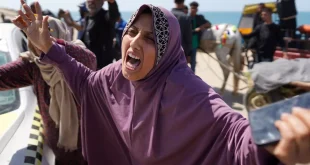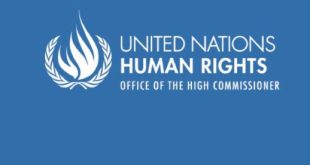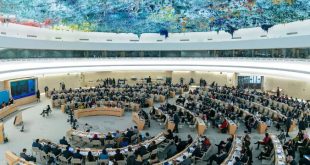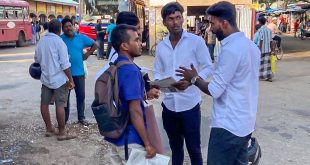 UNITED NATIONS, Aug 10, 2011 (IPS) – The beleaguered government of Syrian President Bashar al-Assad has so far defied the Security Council, ignored appeals by U.N. Secretary-General Ban Ki-moon, rejected pleas from neighbouring Turkey and the Arab world, and summarily dismissed the threats and sanctions by Western powers.
UNITED NATIONS, Aug 10, 2011 (IPS) – The beleaguered government of Syrian President Bashar al-Assad has so far defied the Security Council, ignored appeals by U.N. Secretary-General Ban Ki-moon, rejected pleas from neighbouring Turkey and the Arab world, and summarily dismissed the threats and sanctions by Western powers.
But how is it going to react to a plea from IBSA, the emerging new political coalition of India, Brazil and South Africa, which sent a three-member delegation to Damascus last week to help defuse the ongoing political tension in Syria?
All three countries of the global South are not only powerful economic players on the international stage but are also, coincidentally, current non-permanent members of the 15-member Security Council (while they continue to stake their longstanding claims for permanent seats).
"A new era of international politics is emerging," says James A. Paul, executive director of the New York-based Global Policy Forum, which closely monitors day-to-day developments in the Security Council and the United Nations.
The Syria initiative of the governments of India, Brazil and South Africa is extremely important, he added.
"Each of these countries is a member of the Security Council and all of them are strongly opposed to a military response, along the path followed in Libya," Paul told IPS.
"They believe that the Libya action by the Council, pushed beyond the intentions of Council members by the United States, UK and France, has had disastrous results," he added.
In light of additional violent actions by the Syrian government towards a peaceful opposition – even after the recent presidential statement by the Council – these countries are doing all possible to promote a peaceful resolution to the conflict, he said.
Some human rights groups disagreed. Peggy Hicks, global advocacy director of Human Rights Watch, said Wednesday, "We are disappointed by the IBSA delegation's statement on its Syria visit. While we recognise that more candid talk may have taken place in private, Brazil, India, and South Africa need to do more than repeat the tired explanations of al-Assad's government.
"Had the delegation itself gotten outside of Damascus, and seen the cities under siege by Syrian forces or visited any of the many hundreds of security service detention facilities where protesters are being held, it would have itself seen directly that Syrian forces bear the lion's share of the responsibility for the death and destruction of the past five months.
"It's time to talk sanctions, arms embargo and a commission of inquiry," she added.
However, Paul argued that the visit to Damascus by IBSA representatives increases the pressure on the al-Assad regime to act responsibly.
"We see here an emerging global diplomacy that is flexible, innovative and opposed to great power military intervention," he noted.
Turkey is also involved to some extent in this process. But as U.S. power wanes, and new crises emerge, said Paul, "We can expect further initiatives of this kind, particularly from these three important players."
As non-permanent members, all three countries hold office only for a two-year term. But they have recently been taking a collective political stand on issues on the Security Council agenda.
And as part of a geographical rotation, India is presiding over the Security Council for the month of August – thereby giving both IBSA and the South Asian country additional political clout.
The visiting IBSA delegation told the Syrian president all three countries express "grave concern at the current situation in Syria and condemned violence from all sides".
"They regretted all loss of life and were concerned over the humanitarian aspect of the violence."
The delegation also called for "an immediate end to all violence and urged all sides to act with utmost restraint and respect for human rights and international human rights law."
The Syrian president reportedly reassured the delegation of his commitment to the reform process, aimed at ushering in multi-party democracy, including through the revision of the existing constitution.
The process of revision of the constitution is expected to be completed by February or March next year.
A statement released by IBSA said the Syrian president also "acknowledged that some mistakes had been made by the security forces in the initial stages of the unrest and that efforts were underway to prevent their recurrence."
Meanwhile, a presidential statement released by the Security Council in early August, which had the blessings of all three countries, condemned "the widespread violations of human rights and the use of force against civilians by Syrian authorities".
In a politically balancing act, the Security Council also called for "an immediate end to all violence and urged all sides to act with utmost restraint, and to refrain from reprisals, including attacks against state institutions."
Still, the Council reaffirmed "its strong commitment to the sovereignty, independence and territorial integrity of Syria".
The political turmoil in Syria, which began last March, has claimed more than 2,000 lives, including civilians and members of the country's security forces.
U.N. High Commissioner for Human Rights Navi Pillay has called for an end "to bloodshed and brutality" by the Syrian authorities.
IBSA, which was established in June 2003, has been described as "a coordinating mechanism amongst three emerging countries, three multi- ethnic and multi-cultural democracies, which are determined to contribute to the construction of a new international architecture, to bring their voice together on global issues and to deepen their ties in various areas".
But its primary focus is to cooperate and partner with the world's developing and least developed countries in the social and economic fields.
thalif deen
un bureau chief & regional director
inter press service (IPS) news agency
united nations, room L-214
new york, ny 10017
ph: 1-212-963-6156
thalifdeen@aol.com
tmd30@columbia.edu
www.ipsnews.net
 Sri lanka Muslims Web Portal Diversity and Inclusiveness
Sri lanka Muslims Web Portal Diversity and Inclusiveness



